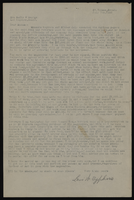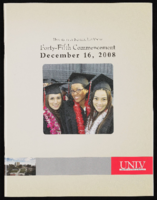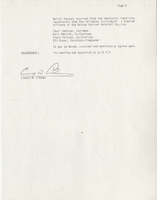Search the Special Collections and Archives Portal
Search Results

Correspondence, Levi Syphus to Sadie George
Date
Archival Collection
Description
Text

University of Nevada, Las Vegas (UNLV) 45th commencement program
Date
Archival Collection
Description
Commencement program from University of Nevada, Las Vegas Commencement Programs and Graduation Lists (UA-00115).
Text


Junior Fonotisatele oral history interview: transcript
Date
Archival Collection
Description
Oral history interview with Junior Fonotisatele conducted by Cecilia Winchell and Stefani Evans on November 10, 2021 for Reflections: The Las Vegas Asian American and Pacific Islander Oral History Project. Junior discusses his Samoan background and the importance of strong family values. He talks about his early years in Utah and California before moving to Las Vegas where he attended and graduated from the University of Nevada, Las Vegas. Junior shares his employment history as a bodyguard for Floyd Mayweather, an entrepreneur of a clothing brand, and an investor into a range of ventures including security, solar energy, and mental health. He concludes with a discussion of Samoan cultural celebrations, his religion, and the significance of his tattoos.
Text

Transcript of interview with Ray Keith by David Alexander, March 3, 1980
Date
Archival Collection
Description
On March 3, 1980, David Alexander interviewed community volunteer, Ray Keith (born October 1st, 1911 in Montgomery, Alabama) in her home in Las Vegas, Nevada about her life and memories of Southern Nevada. The two discuss how Keith first arrived in Las Vegas and the addresses that she has lived at. The interview concludes with Keith explaining how she helped to charter the “Home of the Good Shepherd” housing facilities with local Las Vegas women in the sixties.
Text

Transcript of interview with Bob Campagna by Kathleen Neumann, March 17, 1978
Date
Archival Collection
Description
Text

Transcript of interview with Sherwin "Scoop" Garside by David Anderson, March 25, 1976
Date
Archival Collection
Description
On March 25, 1976, David Anderson interviewed Sherwin “Scoop” Garside (born May 26, 1915 in Tonopah, Nevada) about his life in Southern Nevada. Garside first talks about his father’s business in running an early Nevada newspaper and his personal knowledge of the early mining that took place in different parts of Nevada. He also talks about living in the town of Tonopah, the American Indians who lived in the area, and his experiences from living in Las Vegas. Garside also mentions the beginnings of gambling in Las Vegas, the population boom periods of Las Vegas, and his experiences in witnessing the aboveground atomic testing.
Text

Interview with Robert Hahn, October 29, 2004
Date
Archival Collection
Description
Text

Interview with Robert Elmer Friedrichs, February 25, 2005
Date
Archival Collection
Description
Text

